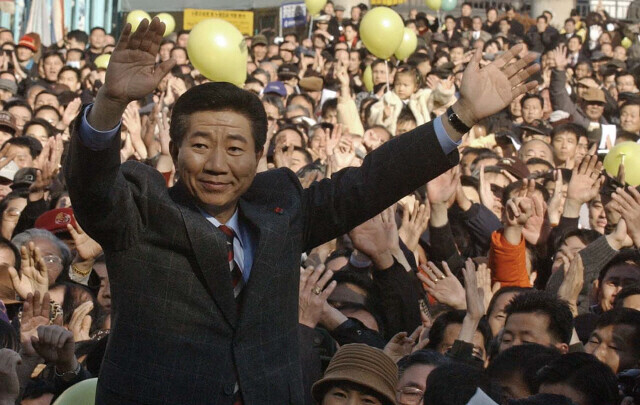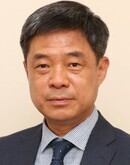hankyoreh
Links to other country sites 다른 나라 사이트 링크
[Column] Change is key to victory in upcoming election


By Back Ki-chul, executive editor
The 20th South Korean presidential election in March 2022 is shaping up into something comparable to the 2002 race, when the presidency passed from Kim Dae-jung to Roh Moo-hyun.
That election saw the public deciding to reelect what is now the Democratic Party, after Kim had won five years earlier in the first election where the incumbent president's party was voted out of office.
A similar situation unfolded with the 2012 presidential election, where Park Geun-hye was elected to succeed Lee Myung-bak. One of the things people are watching to see with the upcoming election is whether the Democratic Party can win reelection for the first time since 2002.
A certain pattern can be found in the 2002 and 2012 elections where the incumbent's party remained in power: major shifts that amounted to a "regime change" in the public's view. A key part of that has been major overhauls in terms of individuals, camps, and policies.
Roh Moo-hyun stressed the importance of overcoming regionalism and vested interests, distinguishing himself with policy plans such as relocating the capital and reforming the prosecution. As a prospective candidate, he managed to overcome the party establishment thanks to grassroots support.
Similarly, Park Geun-hye had belonged to a different wing of her party from the pro-Lee Myung-bak contingent. She pledged "economic democratization," even if it turned out to be an empty promise.
Whether the incumbent president's party has been voted out or kept in office, it has taken place against a backdrop of large-scale change. Overseas observers seem to view this very dynamism as one of the factors behind South Korea's growth to become a developed country.
Japan is different in that sense. In South Korea, the Democratic Party and its previous incarnations have spent a total of 15 years in office, twice by defeating the incumbent president's party. In Japan, there have been only two incomplete "regime changes," lasting for just over four years.
An excellent illustration of the difference between the two sides can be found by comparing Roh with former Japanese Prime Minister Junichiro Koizumi.
Both of them got on fairly well before Koizumi started visiting Tokyo's controversial Yasukuni Shrine. As a president, Roh was decidedly non-mainstream, while Koizumi became prime minister on the strength of his public popularity for battling the Kakuei Tanaka wing of the Liberal Democratic Party.
But when it came to content, they were quite different.
To put it in terms the late Roh Hoe-chan might have used, Roh was a politician who "flipped the grill pan" of South Korean politics. Koizumi outwardly advocated reforms, but in practice he retained — and even reinforced — the dominance of factional and bureaucratic politics, including the so-called "construction tribe (kensetsu zoku)."
He adopted a completely subordinate role for Japan vis-à-vis the US and made regular visits to Yasukuni. His "wolf in sheep's clothing" approach to politics was carried on by successor Shinzo Abe.
In the book "Japan and the Shackles of the Past," which was recently published in Korean translation, the American author attributes Japan's stagnation over the past 30 years to a political situation where responsibilities and authority are unclear and to a politics of conservative hegemony that reveres "Japanese-ness" while relying on the US.
"[The Japanese] turn their gaze across the Sea of Japan in fear and wonderment at South Korea, a country they long treated contemptuously as a kind of poor relation," the author writes.
The conclusion is that with clear power structures and responsibility and with bold and swift decision-making, South Korea's political and economic institutions have taken the lead over the kind of groupthink that is widespread in Japanese politics and businesses.
According to this perspective, the concentration of authority and the frequent ruptures and upheavals are actually viewed as strengths. Despite all the twists and turns over the years, South Korea has advanced steadily to become a developed country, with industrialization and democratization as its two main driving forces.
Upsetting the apple cart — "flipping the grill pan," as it were — is not always the best thing. An "advanced country" needs mature leadership and a higher form of dynamism.
So far, we've been experiencing radical changes under our imperial presidency system. Now is a time that calls for a particularly difficult type of reform: overturning that very imperial presidency system, which has lived out its life.
In any event, the next presidential election will be an occasion for one more flip of the pan. One thing is clear: both the ruling and opposition party's chances hinge on making the right changes in terms of individuals, camps, and policies.
As we've seen twice in past elections, reelecting the incumbent president's party has been a process of discontinuity rather than continuity. It's too much for the Democratic Party to hope that it can remain in office without changing anything about its camps, individuals, and policies.
Bringing a bunch of people as a "folding screen" of sorts does not constitute a change in camps. The mud-slinging battle between the Democratic Party's two leading contenders, Gyeonggi Gov. Lee Jae-myung and former party leader Lee Nak-yon, is a long way from a contest of visions.
There's no hope for a change in camps or reelection when people revert to "pro-Moon" and "pro-Roh" allegiances. In the 2002 election, Roh did not overtly distinguish himself from Kim Dae-jung, but he managed to get a new camp in power by presenting his own unique vision. Kim, for his part, showed the wisdom to get out of his way to some extent by leaving the party.
If the Democrats' hope is to win reelection, they will need a major overhaul to their camp rivalries that transcends what we currently have.
For the PPP, it's a more or less impossible dream to expect to win the election by stressing only their opposition to Moon Jae-in, while keeping the same people and policies in place.
Yoon Seok-youl presented real estate policies as his first election pledge, but he seemed somehow like he was dressed up in someone else's clothes. It was somewhat stomach-churning to him talking about "how our military got into this state" while standing next to retired generals referred to as "shooting stars."
A presidential candidate should make a priority of sharing the policies that they truly understand and want to implement. They need to stand beside the people who will make those policies happen. They should clearly demonstrate what their "representative" policy is — a policy that reflects their own life experience.
It will be hard for anyone on either side to even become a candidate if they fail to take that first step in terms of a timely vision and a change in policies and camps.
By Back Ki-chul, executive editor
Please direct comments or questions to [english@hani.co.kr]

Editorial・opinion
![[Editorial] Does Yoon think the Korean public is wrong? [Editorial] Does Yoon think the Korean public is wrong?](https://flexible.img.hani.co.kr/flexible/normal/500/300/imgdb/original/2024/0417/8517133419684774.jpg) [Editorial] Does Yoon think the Korean public is wrong?
[Editorial] Does Yoon think the Korean public is wrong?![[Editorial] As it bolsters its alliance with US, Japan must be accountable for past [Editorial] As it bolsters its alliance with US, Japan must be accountable for past](https://flexible.img.hani.co.kr/flexible/normal/500/300/imgdb/original/2024/0417/6817133413968321.jpg) [Editorial] As it bolsters its alliance with US, Japan must be accountable for past
[Editorial] As it bolsters its alliance with US, Japan must be accountable for past- [Guest essay] Amending the Constitution is Yoon’s key to leaving office in public’s good graces
- [Editorial] 10 years on, lessons of Sewol tragedy must never be forgotten
- [Column] A death blow to Korea’s prosecutor politics
- [Correspondent’s column] The US and the end of Japanese pacifism
- [Guest essay] How Korea turned its trainee doctors into monsters
- [Guest essay] As someone who helped forge Seoul-Moscow ties, their status today troubles me
- [Editorial] Koreans sent a loud and clear message to Yoon
- [Column] In Korea’s midterm elections, it’s time for accountability
Most viewed articles
- 1Samsung barricades office as unionized workers strike for better conditions
- 2[Column] The clock is ticking for Korea’s first lady
- 3[Editorial] When the choice is kids or career, Korea will never overcome birth rate woes
- 4Why Israel isn’t hitting Iran with immediate retaliation
- 5[News analysis] After elections, prosecutorial reform will likely make legislative agenda
- 6S. Korea, Japan reaffirm commitment to strengthening trilateral ties with US
- 7Japan officially says compensation of Korean forced laborers isn’t its responsibility
- 8[Editorial] As it bolsters its alliance with US, Japan must be accountable for past
- 9[Editorial] Does Yoon think the Korean public is wrong?
- 10[Guest essay] How Korea turned its trainee doctors into monsters